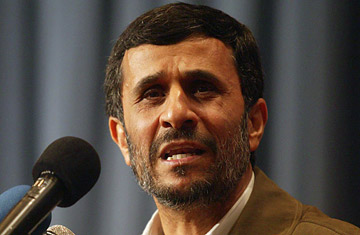
Iranian President Mahmoud Ahmadinejad
By landing his plane in New Delhi on what was to have been a routine refueling stop, Iran's President Mahmoud Ahmadinejad has provoked a diplomatic contretemps between India and the U.S. that reveals the fragility of their emerging alliance. New Delhi remains deeply wary over being seen to be doing Washington's bidding when it comes to dealing with other countries.
The furor began when New Delhi received a request for Ahmadinejad's plane to make refueling stop on a flight home from Sri Lanka. The Indian government, which has of late been remedying its prolonged neglect of the West Asian region, pounced on the opportunity to host the Iranian President. Turning the six-hour stopover into an official visit, the government hoped, would also smooth the ruffled feathers of its leftist coalition partners, who have accused the government of betraying old friends like Iran and pandering to the U.S. ever since India voted at the International Atomic Energy Agency in 2005 to refer Iran's nuclear program to the U.N. Security Council. Also, with negotiations over a $7 billion Iran-Pakistan-India gas pipeline stalling, India saw the visit as a chance to breathe life back into a project desperately needed by energy-starved India.
But the announcement that Ahmedinejad would be feted in New Delhi didn't pass without comment from Washington. State Department spokesperson Tom Casey, in reply to a question, said: "We would hope that the Indian government... would call on [Ahmadinejad] to meet the requirements that the Security Council and the international community has placed on him in terms of suspending their uranium enrichment activities and complying with the other requirements regarding their nuclear programme." That statement piqued India's Ministry of External Affairs, which responded: "India and Iran are ancient civilizations whose relations span centuries. Both nations are perfectly capable of managing all aspects of their relationship with the appropriate degree of care and attention." In a sharper tone, the statement added: "Neither country needs any guidance on the future conduct of bilateral relations as both countries believe that engagement and dialogue alone lead to peace." Washington quickly moved to defuse the tension, with Assistant Secretary of State for South Asia Richard Boucher saying the issue had been blown out of proportion: "It's up to every country to determine for itself how it's going to organize its bilateral relations."
Boucher may have ended the verbal spat, but the episode has once again highlighted India's diplomatic dilemma, as it cozies up to the world's only — but highly unpopular — superpower while not annoying traditional allies and preserving its own self-interest. "Iran is the litmus test for India's foreign policy," says former diplomat Rajiv Sikri. "India and Iran have been allies historically, and India's interests are bound with Iran's. If India cannot take a free stand on Iran, it can hardly hope to claim an independent foreign policy."
Iran considers itself the leader of the world's Shi'ite Muslims, and India has the world's second largest Shi'ite population, at 20 million. Iran has previously backed India against Pakistan's claims over Kashmir in the Organization of the Islamic Conference, an international forum of Muslim and Muslim-majority countries. Iranian ports have also allowed India to circumnavigate Pakistan in trading with Central Asia. Iran, for its part, needs Indian business, investment and technology cooperation.
The gesture to Ahmadinejad demonstrates that even at the expense of upsetting the U.S., India is keen to mend relations with Iran that were damaged when New Delhi voted with Washington at the IAEA in 2005. "There is an increasing realization in India that India's interests in the region are tied with Iran's," says Prof A.K. Pasha, a Middle East expert at New Delhi's Jawaharlal Nehru University. "Iran is the only country that can give credible help to Indian efforts to rebuild Afghanistan. And India must ensure that Iran remains on India's side and does not side with Pakistan as it did during the Iran-Iraq war, when India did not sufficiently support Iran." In the past, India has similarly asserted its diplomatic independence from the U.S. over Myanmar — while the U.S. and the E.U. were trying to isolate the military junta and impose sanctions, India was supplying military hardware and carrying out infrastructure projects in the country.
Still, analysts point out, India is yet to formulate a clear-cut policy on how to deal with issues where its interests conflict with those of the United States. "And it's high time it did," says Sikri. "If India could take an independent stance 50 years ago, it should be able to do so now when it is too big to be pushed around."
